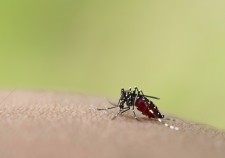French pharmaceutical giant Sanofi recently gained regulatory approval in Mexico for its widely anticipated dengue vaccine, Dengvaxia, which is the first of its kind geared towards combating the dangerous and potentially-deadly mosquito-borne virus.
The vaccine was tested in two large clinical trials involving over 40,000 children and adolescents, and it was shown to offer protection to roughly 66 percent of subjects tested, who were aged nine and older. The trials were conducted across Latin America and Asia.
The dengue virus, also known as "breakbone fever," is transmitted by the Aedes Aegypti mosquito. In those infected, the virus is known most for producing severe pain in the joints and muscles. Dengue has four distinct serotypes, or groupings, with the most fatal producing the Dengue Hemorrhagic Fever, which is characterized in part by tiny spots of blood on the skin and larger patches of blood under it.
Most notable about Dengvaxia is that it's most effective in offering protection against this severe form of dengue, with results from clinical trials showing that it prevented 93 percent of cases. The vaccine was also shown to deliver an 80 percent decrease in hospitalizations.
The cost of the vaccine has yet to be determined. But since it's likely Dengvaxia will initially be marketed in poorer countries, where the prevalence for dengue is greatest, this could pose a dilemma for Sanofi. A balance will need to be struck between turning a profit and providing such crucial healthcare to those who need it the most.
While once widely thought to be mainly a tropical disease, recent outbreaks in Florida and Hawaii have brought dengue closer to home here in the United States. According to the World Health Organization, only nine countries had experienced severe dengue epidemics before 1970. Today, however, the disease is endemic in more than 100 countries, ranging from regions in Africa, all three Americas, the Eastern Mediterranean, South-East Asia and the Western Pacific.



